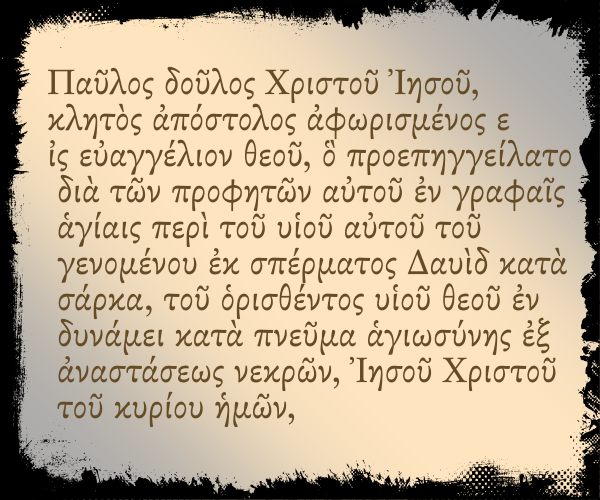
The following is a collection of my personal notes from my study on the Greek text of Romans. It is not intended as a scholarly work for publication. Therefore, expect spelling errors, typos and other such things. You will find them! There are probably some html coding errors as well; I’m still trying to learn that. It includes identification (parsing) of Greek words, declension and conjugations, grammar and syntax notes and references to tools for studying the text, just about anything I thought I might want to be able to go back and review or restudy.
The translation given is my own for the most part. It is not intended to be necessarily good smooth politically correct English, but one to help me, at least, understand the intent and structure of the Greek text. I would not use this text for public reading if I were teaching a passage. For more readable English translations use the NASV or NIV or another that suits you.
These notes do not say much at all about the overall flow of thought and the relationship between the various ideas of different passages. For that, see the author’s study, Romans Revisited. That is a macro-view; it looks at the major connections and relationships between the verses and different sections of Romans. These notes are a micro-view and look more at the smaller details in the verses for one must see the whole as well as the parts. The forest can only be understood if one understands the individual trees, but a tree will never be truly comprehended unless it is seen as a part of a forest.
If this is helpful to you, great! use it. If not, you are not required to read any further. Comments and corrections are always appreciated yet not required. I try to listen with an open mind; however, I’m not really interested in pointless theological or philosophical debates. In any case, may my Lord and God richly bless you!
Note: I am currently updating the notes as I have continued to study Greek grammar. While some things about the text have changed in my understanding, those changes are minor. I am currently replacing most abbreviations except for those involving the declensions of Greek substantives.
| AG | William F. Arndt and Wilbur Gingrich, A Greek-English Lexicon of the New Testament and Other Early Christian Literature, 4th ed. (Chicago: University of Chicago Press, 1957). |
| ATR | A. T. Robertson, A Grammar of the Greek New Testament in the Light of Historical Research (Nashville: Broadman Press, 1934). |
| DM | H. E. Dana and Julius R. Mantey, A Manual Grammar of the Greek New Testament, (Toronto: Macmillan, 1955). |
| WM | William D. Mounce, Basics of Biblical Greek, 4th ed. (Grand Rapids: Zondervan, 2019). |
| WEV | W.E. Vine,Vine’s Complete Expository Dictionary of Old and New Testament Words, edited by Merrill F. Unger and William White, Jr. (published in 1940 and without copyright.) |
| WMWeb, | William D. Mounce, billmounce.com/greek-dictionary, (2024) |
| For Gender | m-masculine, f-feminine, n-neuter |
| For Number | s-singular, p-plural |
| For Case | n-nominative, g-genitive, d-dative, a-accusative, v-vocative |
| Example | θεοῦ: msg- masculine, singular, genitive |
| For Tense | p-present, impf-imperfect, f-future, a-aorist, p-perfect, plf-pluperfect |
| For Voice | a-active, m-middle, p-passive |
| For Mood | i-indicative, s-subjunctive, o-optative, imv-imperative, inf-infinitive, ptcp-participle |
| For Person | 1-first person, 2-second person, 3-third person |
| For Number | s-singular, p-plural |
| Example 1 | προεπηγγείλατο: a,m,ind,3s-aorist, middle, indicative, third person, singular |
| Example 2 | ἀφωρισμένος: pf, p, ptcp, msn -perfect, passive, participle, masculine, singular, nominative |
| abs - absolute | acc - accusative |
| act - active | adj - adjective |
| adv - adverb | art - article/articular |
| cond - conditional | conj - conjunction |
| d.o. - direct object | dat - dative |
| demo - demonstrative | gen - genitive |
| i.o. - indirect object | indec - indeclinable |
| intr - interrogative | KJV - King James Version |
| mid - middle; | NASV - New American Standard Version (1995); |
| nom - nominative | neg - negative |
| NIV - New International Version | obj - object |
| pass - passive | pers - personal/person |
| pred - predicate | prep - preposition |
| pro - pronoun | ptcl - particle |
| rel - relative | sub - subject |